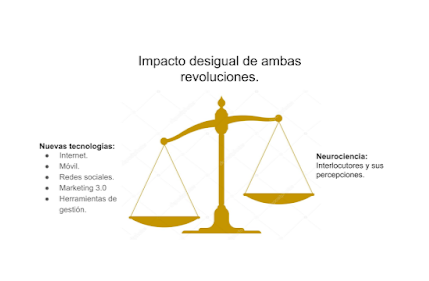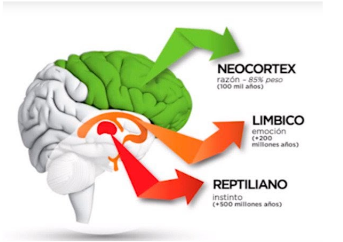NEURO-SALES FOR ENTREPRENEURS
Accelerate your business with these expert tips on "NeuroSales for Entrepreneurs". Analyse and discover this TIP!
Neuro-sales for entrepreneurs are a useful tool for understanding human behaviour and improving sales effectiveness.
Here are some practical tips that entrepreneurs can apply to their businesses
- Know your target audience: Before you sell, you must know your target audience. Identify the behaviours and motivations that drive your audience's buying decisions. Analyse their needs and adapt your sales strategies to them.
- It creates an emotional experience: Sales are not exclusively driven by rational motives. Emotions have a great impact on purchasing decisions. Therefore, you should strive to create a positive emotional experience for your potential customers. If you can make them feel comfortable and confident, you are more likely to close the sale.
- Use stories: Stories have great power to connect with your audience. Use stories that show how your product or service can help solve problems or improve the lives of your potential customers. If you can show them how your product can positively impact their lives, you will be more likely to sell.
- Non-verbal language: Non-verbal language is an important part of neuro-sales. Learn to read the non-verbal cues of your potential customers, such as their body posture and facial expressions. If you can adjust your body language to convey confidence and trust, your chances of making a sale will increase.
- Use scarcity: The human brain has a tendency to value more what is scarce. Use this tendency in your sales strategies, for example, by creating an offer that is limited in time or quantity. If you can create a sense of scarcity in your potential customers, you will be more likely to sell.
In short, neuro-sales are a powerful tool to improve sales effectiveness in your company. Learn to know your target audience, create an emotional experience, use stories, pay attention to non-verbal language and use scarcity to increase your chances of selling.
Practical examples of neuro-sales
HERE ARE SOME PRACTICAL EXAMPLES OF NEURO-SALES:
- Strategic placement of products in the shop: The location of products in the shop influences customers' decision-making. For example, placing high-demand products at customers' eye level and to the left of the main entrance can make them more likely to buy them.
- Use of images and videos on the company's website: Neuroscience has shown that the brain processes images faster than text. Therefore, the use of images and videos on a company's website can be an effective neuro-sales technique to attract and retain customer attention.
- Personalisation of marketing messages: People tend to pay more attention and respond better to personalised messages. By making use of customer information such as name and interests, marketing messages can be personalised to be more effective.
- Creating positive emotions: Positive emotions, such as happiness and excitement, are an important part of consumer decision-making. Companies can use neuro-sales techniques, such as music and bright colours, to create a positive and appealing atmosphere in the shop or on the company's website.
- Creating scarcity: Scarcity is a neuro-sales technique that uses the fear of losing something to motivate customers to make purchasing decisions. For example, limited time offers or a limited quantity of products can be offered to make customers feel that they have to act quickly before the offer runs out.
The great advances in the knowledge of the human brain and its functioning mechanisms have not gone unnoticed by sales marketing experts. As a result of this influence, the neuroventa. We could define it as the sales generated by our knowledge of the human brain. In short, it is a question of understanding the decision-making mechanisms that operate in our minds and, on this basis, providing the most appropriate stimuli.
The contributions of the American neurologist Paul McLean show us that our brain is actually made up of three brains:
- Reptilian: in which the basic instinctsreacting to danger, etc. It is responsible for instinctive buying.
- Limbic: responsible for the emotions. It is obviously the cause of emotional shopping.
- Cortex: to him we owe our ability to reason. Purchasing decisions made by the cortex are obviously rational.
IN ORDER TO BUILD EFFECTIVE SALES PITCHES WE NEED TO LOOK AT A NUMBER OF KEY ISSUES:
When we decide to go out to eat in a restaurant we do so driven by instinct which is hunger. The emotions manifest in the fact that we will obviously go to a place where we feel comfortable. But if we are going to eat hamburgers, the cortex probably won't influence the decision too much. Selling, like any form of relations between people, is a communicative fact. As old as the human being.
COMMUNICATION IS CURRENTLY FACING TWO MAJOR REVOLUTIONS:
- The first is the more obvious and comes hand in hand with technologies that have changed our lives to such an extent that hardly anyone on this planet can claim not to have been affected by them: the Internet and mobile phones are their greatest exponents.
- The another great revolution is also of enormous importance, and yet it has not had the same widespread impact as the previous one.
We refer to the big ones progress that neuroscience has experimented with in the field of knowledge of the brain, its biochemical composition and processes. These developments have made major contributions to communication and therefore to marketing in general and sales in particular.

This imbalance in the ways in which the two revolutions are received means that many communication professionals are trained in the use of the new digital tools, but are still unable to guarantee that the communication they carry out is truly effective.
THE DOUBTS INHERENT IN ANALOGUE COMMUNICATION REMAIN:
- Are we being effective in shaping and delivering our messages?
- What percentage of our communication resources are we throwing away?
We know that the mastery of technologies is of little use if our messages do not penetrate the brains of our recipients. It is not enough to segment the market more or less skilfully by habits, lifestyles, gender or age.
It is necessary to have the approval of our clients' brains. Brains that condition the ways in which they receive information, process it and transform it into decisions. We ignore the role of the subconscious and emotions, and overvalue rationality. This means that we fail to apply formulas of persuasion and seduction based on a knowledge closer to the reality imposed by our neurons.

We review some of the statements made by experts in neuroscience, which highlight the need to adapt our communication to proven scientific principles. A neuroscientific authority, Damasio, argues that "feeling is an integral component of the machinery of reason". In the same vein, Klein states that "dopamine is the molecule of desire, the fuel of action".
The neuromarketing expert Damasioargues that "a good message is not one that forces conscious thought or deliberation. A good message is one that makes the customer eager to own a product.".
Lastly, many experts say that reasoning should not be confused withthat is, to use logical thinking, which rationalising, which consists of justifying from reasondecisions made on the basis of emotion.
APPLY THIS TIP TO YOUR PROJECT
TASK
CASE STUDY OF AN ENTREPRENEUR USING NEURO-SALES IN HIS NEW VENTURE
Juan is an entrepreneur who has just launched his own online beauty shop. He knows that to stand out in such a competitive market, he needs to apply innovative strategies to reach his target audience.
To do this, Juan decides to apply neuro-sales techniques. He knows that his audience is mainly women and that his products are designed to make them feel beautiful and confident. Therefore, his strategy focuses on connecting emotionally with them through his website and social media.
On his website, Juan uses high quality photographs of smiling and relaxed female models using the products in his shop. He also uses warm, soft colours, which convey tranquillity and harmony. In addition, he uses emotional language to describe the benefits of each product, emphasising how it will help women feel beautiful and confident.
On his social media, Juan uses storytelling techniques, sharing stories of women who have found the solution to their beauty problems in his products. He also uses motivational phrases that connect emotionally with his audience and creates make-up and personal care tutorial videos that generate interaction and engagement with his community.
Thanks to his neuro-sales strategy, Juan manages to significantly increase the sales of his online shop. Women who buy his products feel emotionally connected to the brand and perceive that Juan understands their needs and desires. This gives them a sense of trust and confidence in the quality of the products he offers, which translates into sales.
QUIZ
- 💻 PRACTICE with an expert in the next practical webinar.
- 🔎 CONSULT more related TIPs with this same theme.
- 📖 AMPLIA your knowledge by downloading this EBOOK.
THINK ABOUT YOU
- 🚀 IMPULSA your company in the next acceleration programme, ¡book your place now!
- 🥁 PRACTICE with your project in this practical webinar, ¡apply for your place!
- 🌐 CONTACT with other entrepreneurs and companies, ¡register and take part in the next Networking!
THINK ABOUT HELPING OTHERS
- 🤝COLLABORATE as a volunteer: expert, mentor, inverter, awarding, Spreading the word, challenging, innovating, creating a TIP...
- 💬 RECOMMENDS this programme to reach out to more entrepreneurs by Google.
- 👉 SHARE your learning!
- 📲 SEND this TIP 👇










C'est intéressant et bénéfique pour moi
Merci beaucoup